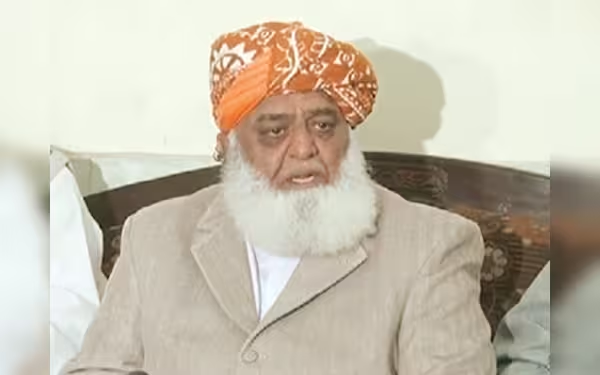Saturday, November 16, 2024 05:37 PM
Fazlur Rehman Rejects Coalition Draft Bill in Pakistan
- Maulana Fazlur Rehman rejects coalition's draft bill.
- Political rifts deepen within the coalition government.
- Concerns over centralization of power and provincial rights.
 Image Credits: tribune.com.pk
Image Credits: tribune.com.pkMaulana Fazlur Rehman rejects the coalition's draft bill, raising concerns over power centralization and provincial rights in Pakistan.
In the ever-evolving landscape of Pakistani politics, the recent developments surrounding the constitutional package have stirred significant controversy. The Jamiat Ulema-e-Islam Fazl (JUI-F), led by the influential Maulana Fazlur Rehman, has emerged as a pivotal player in this political drama. As the government seeks to push through a draft bill that many believe could reshape the political framework, the rejection by Rehman has raised eyebrows and sparked discussions across the nation.
During a media interaction that followed a luncheon hosted by Pakistan Tehreek-e-Insaf (PTI) leader Asad Qaiser, Maulana Fazlur Rehman made his stance clear. He stated, "The draft we were given was reviewed, and it was in no way acceptable." This outright rejection not only highlights the deepening rifts within the coalition but also signals a potential setback for the government's legislative agenda at a time when unity is crucial.
The constitutional package in question has been a topic of heated debate, with various political factions weighing in on its implications. Supporters argue that it is necessary for the stability and progress of the country, while opponents, including Rehman, view it as a threat to democratic principles and regional autonomy. The JUI-F chief's firm stance reflects a broader concern among certain political groups regarding the centralization of power and the potential erosion of provincial rights.
As political maneuvering continues, the implications of this rejection could be far-reaching. It not only complicates the government's efforts to pass the bill but also sets the stage for further negotiations and potential alliances. The political landscape in Pakistan is known for its unpredictability, and this latest development is a reminder of the delicate balance that must be maintained among various stakeholders.
The outright rejection of the coalition's draft bill by Maulana Fazlur Rehman serves as a critical juncture in Pakistan's political narrative. It underscores the importance of dialogue and consensus in governance. As the nation watches closely, the coming days will reveal whether the government can navigate this challenge and find common ground with its political adversaries. The outcome will not only affect the current political climate but also shape the future of governance in Pakistan.













